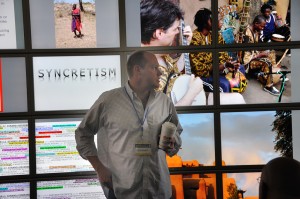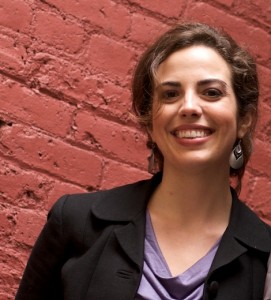2013 November
Simone Browne on Race, Surveillance, and Technology – Mon 12/9, 4:15pm-5:30pm, Skylight Room (9100)
On 26, Nov 2013 | In Events of Interest | By Laura Kane
Please join CUNY DHI and the Digital Praxis Seminar for a talk by Simone Browne on race, surveillance, and technology.
This lecture will be livestreamed at 4:15pm on Dec. 9, 2013
Dark Sousveillance: Surveillance, Race and Resistance
Since its emergence, surveillance studies has been primarily concerned with how and why populations are tracked, profiled, policed, and governed at state borders, in cities, at airports, in public and private spaces, through biometrics, closed-circuit television, identification documents, social media and other technologies. Also of focus are the many ways that those who are often subject to surveillance subvert, adopt, endorse, invite, resist, innovate, limit, comply with and monitor that very surveillance. As an interdisciplinary field of study the questions that shape surveillance studies center on the management of everyday and exceptional life – personal data, privacy, security, and terrorism, for example. While “race” might be a term found in the index of many of the recent edited collections and special journal issues dedicated to the study of surveillance, within the field questions of Blackness remain under-theorized.
Situating Blackness as an absented presence in the field of surveillance studies, this talk questions how the intimate relation between branding and the black body – our biometric past – can allow us to think critically about our biometric present.
About the Speaker
 Simone Browne is Assistant Professor in the Department African and African Diaspora Studies at the University of Texas at Austin. She teaches and researches surveillance studies, biometrics, airport protocol, popular culture, digital media and black diaspora studies.
Simone Browne is Assistant Professor in the Department African and African Diaspora Studies at the University of Texas at Austin. She teaches and researches surveillance studies, biometrics, airport protocol, popular culture, digital media and black diaspora studies.
Tom Scheinfeldt, “Making Hay: Lessons in Collaboration from One Week | One Tool ” – Mon 11/25, 4:15pm-5:30pm, Skylight Room (9100)
On 19, Nov 2013 | In Events of Interest | By Laura Kane
Please join CUNY DHI and the Digital Praxis Seminar for a talk by Tom Scheinfeldt on DH Project Management.
Making Hay: Lessons in Collaboration from One Week | One Tool
Digital Humanities projects are rarely blessed with abundant, or even
adequate, resoruces. Staff, skills, equipment, and money are almost
always tight. The experience of One Week | One Tool
(http://oneweekonetool.org), an NEH Institute for Advanced Topics in
Digital Humanties, demonstrates that time and resource constraints can
be made to work in a project’s favor. First in 2010 and again in 2013,
One Week | One Tool brought together a diverse group of academic and
cultural professionals to conceive, plan, build, and launch an open
source software tool in only seven days. Despite, or perhaps because
of, these strict contraints, both groups succeeded in releasing what
have proved to be extremely well-used tools for humanities research:
Anthologize and Serendip-o-matic. This talk will explore some of the
lessons learned from One Week | One Tool for collaboration and project
management in digital humanities and the academic work at large.
About the Speaker
 Tom Scheinfeldt is Associate Professor of Digital Media and Design and Director of Digital Humanities in the Digital Media Center at the University of Connecticut. Formerly Managing Director of the Roy Rosenzweig Center for History and New Media at George Mason University, Tom has directed several award-winning digital humanities projects, including THATCamp, Omeka, and the September 11 Digital Archive. Trained as an historian of science and public historian with a bachelor’s degree from Harvard and master’s and doctoral degrees from Oxford, Tom has written and lectured extensively about the history of museums and the role of history in culture. Among his publications, Tom is a recent contributor to Debates in Digital Humanities (University of Minnesota Press) and co-editor of Hacking the Academy (University of Michigan Press). Tom blogs about digital humanities and the business of digital humanities at Found History and co-hosts the Digital Campus podcast will his colleagues Dan Cohen, Amanda French, Mills Kelly, and Stephen Robertson. You can follow Tom on Twitter (@foundhistory) and LinkedIn (http://www.linkedin.com/in/tomscheinfeldt/).
Tom Scheinfeldt is Associate Professor of Digital Media and Design and Director of Digital Humanities in the Digital Media Center at the University of Connecticut. Formerly Managing Director of the Roy Rosenzweig Center for History and New Media at George Mason University, Tom has directed several award-winning digital humanities projects, including THATCamp, Omeka, and the September 11 Digital Archive. Trained as an historian of science and public historian with a bachelor’s degree from Harvard and master’s and doctoral degrees from Oxford, Tom has written and lectured extensively about the history of museums and the role of history in culture. Among his publications, Tom is a recent contributor to Debates in Digital Humanities (University of Minnesota Press) and co-editor of Hacking the Academy (University of Michigan Press). Tom blogs about digital humanities and the business of digital humanities at Found History and co-hosts the Digital Campus podcast will his colleagues Dan Cohen, Amanda French, Mills Kelly, and Stephen Robertson. You can follow Tom on Twitter (@foundhistory) and LinkedIn (http://www.linkedin.com/in/tomscheinfeldt/).
Katina Rogers on Alt-Academic Careers: Mon 11/18, 4:15p-5:30p Rooms 9204/9205
On 11, Nov 2013 | In Events of Interest | By Laura Kane
Please join CUNY DHI and the Digital Praxis Seminar for a talk by Katina Rogers on Alt-Academic Careers.
Katina Rogers – Alt-Academic Careers
While many graduate programs continue to focus on tenure track placement rates, a growing proportion of humanities scholars are embracing a much broader range of intellectually stimulating careers in, around, and beyond the academy. Focusing both on her own career path and on her research at the Modern Language Association, the Scholarly Communication Institute, and the Scholars’ Lab at the University of Virginia, Katina Rogers will discuss strategies to support professionalization, public scholarship, and career development across a wide array of possible outcomes.
About the Speaker
 Katina Rogers is managing editor of MLA Commons, the Modern Language Association’s new online platform for collaboration and scholarly communication. She previously served as Senior Research Specialist with the Scholarly Communication Institute, a Mellon-funded humanities think tank based in the University of Virginia’s Scholars’ Lab. Her current research focuses on graduate education reform, career paths for humanities scholars, and innovative modes of scholarly production. Katina holds a Ph.D. in Comparative Literature from the University of Colorado.
Katina Rogers is managing editor of MLA Commons, the Modern Language Association’s new online platform for collaboration and scholarly communication. She previously served as Senior Research Specialist with the Scholarly Communication Institute, a Mellon-funded humanities think tank based in the University of Virginia’s Scholars’ Lab. Her current research focuses on graduate education reform, career paths for humanities scholars, and innovative modes of scholarly production. Katina holds a Ph.D. in Comparative Literature from the University of Colorado.
Ray Siemens, “Building Blocks of the Social Scholarly Edition” – Mon 11/11, 4:15p-5:30p, Rooms 9204/9205
On 06, Nov 2013 | In Events of Interest | By Laura Kane
Please join CUNY DHI and the Digital Praxis Seminar for a talk by Ray Siemens on the digital social edition.
“Building Blocks of the Social Scholarly Edition”
This talk explores elements of the scholarly edition in the context of new and emerging social media from two pertinent perspectives: the first from the foundational perspective of its theoretical context, particularly as that context intersects with a utility-based consideration of the toolkit that allows us to consider the social edition as an extension of the traditions in which it is situated and which it has the potential to inform productively; the second is from the perspective of an iterative implementation of one such edition, A Social Edition of the Devonshire MS [BL Add MS 17,492] (http://en.wikibooks.org/wiki/The_Devonshire_Manuscript), carried out via a research team operating in conjunction with an advisory group representing key expertise in the methods and content-area embraced by the edition.
About the Speaker
 Ray Siemens (http://web.uvic.ca/~siemens) is Canada Research Chair in Humanities Computing and Distinguished Professor in the Faculty of Humanities at the University of Victoria, in English and Computer Science, and visiting professor at NYU in 2013. He is founding editor of the electronic scholarly journal Early Modern Literary Studies, and his publications include, among others, Blackwell’s Companion to Digital Humanities (with Schreibman and Unsworth), Blackwell’s Companion to Digital Literary Studies (with Schreibman), A Social Edition of the Devonshire MS, and Literary Studies in the Digital Age (MLA, with Price). He directs the Implementing New Knowledge Environments project, the Digital Humanities Summer Institute and the UVic Electronic Textual Cultures Lab, and serves as Vice President of the Canadian Federation of the Humanities and Social Sciences for Research Dissemination and Chair of the Modern Language Association’s Committee on Scholarly Editions, recently serving also as Chair of the international Alliance of Digital Humanities Organisations’ Steering Committee.
Ray Siemens (http://web.uvic.ca/~siemens) is Canada Research Chair in Humanities Computing and Distinguished Professor in the Faculty of Humanities at the University of Victoria, in English and Computer Science, and visiting professor at NYU in 2013. He is founding editor of the electronic scholarly journal Early Modern Literary Studies, and his publications include, among others, Blackwell’s Companion to Digital Humanities (with Schreibman and Unsworth), Blackwell’s Companion to Digital Literary Studies (with Schreibman), A Social Edition of the Devonshire MS, and Literary Studies in the Digital Age (MLA, with Price). He directs the Implementing New Knowledge Environments project, the Digital Humanities Summer Institute and the UVic Electronic Textual Cultures Lab, and serves as Vice President of the Canadian Federation of the Humanities and Social Sciences for Research Dissemination and Chair of the Modern Language Association’s Committee on Scholarly Editions, recently serving also as Chair of the international Alliance of Digital Humanities Organisations’ Steering Committee.

 Welcome to the blog of the CUNY DHI, an effort to build momentum and community around Digital Humanities practitioners at CUNY. We hope you'll join us at our upcoming events and that you'll follow this blog to hear about the latest news in the field.
Welcome to the blog of the CUNY DHI, an effort to build momentum and community around Digital Humanities practitioners at CUNY. We hope you'll join us at our upcoming events and that you'll follow this blog to hear about the latest news in the field.



Recent Comments